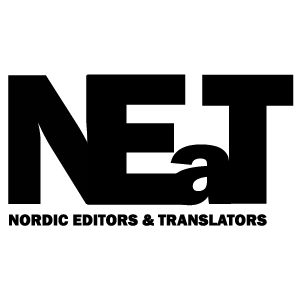
A little bird has tweeted that Nordic Editors and Translators (NEaT) has recently celebrated their 5th jubilee … cause for a resounding kippis! ('cheers!' in Finnish) to our sister society, if ever there were.
To hear NEaT tell it, everything began on a cold mid-January day of 2014 in the hazy back room of a small Helsinki pub, the Leijuva Lahna. It was there that the mission, the name, and the founding members, some twenty in all, came together to create a professional network of editors, translators, and language professionals. Julie Uusinarkaus was to act as chair that first year, Daryl Taylor did the legal documentation and paperwork, and Virve Juhola translated everything into Finnish. On 20 October 2014, the Nordic Editors and Translators association became registered as a professional organization in the Finnish Register of Associations.
Of course, all founding fables have a back story, and NEaT’s began at the Mediterranean Editors and Translators Meeting 2011. Four revisors from the University of Helsinki – Julie Uusinarkaus, Lisa Muszynski, John Gage, and Stephen Stalter – met with MET members Mary Ellen Kerans, Marije de Jager and Alan Lounds to ask them about how to create an editors’ association in Finland and the other Nordic countries. Back in Helsinki, the team began collecting the names of local editors who might be interested in launching an organization. In 2012, Lisa and Julie began their first editing seminars at the university. When Virve joined the effort, translation was added into the organizational mix. By the end of 2013, just in time for a mid-winter’s founding, the list of potential members of what was soon to become an association of editors and translators had built to around 100 professionals. A star was born.
Over the years, NEaT has held a number of events, and under the watchful eye of the likes of stalwarts Julie, Lisa, Virve and Ian Mac Eochagáin they just keep getting better. In September 2014, NEaT partnered with KAJ (since 2019: Kieliasiantuntijat), the Finnish trade union for language specialists, and SKTL, the Finnish Association of Translators and Interpreters, to present a seminar on noun stacking by lecturer Stephen Stalter. The following year, an annual NEaT event, English Today, was introduced together with new partner the Finnish-British Society (Finn-Brit), and a panel discussion on Demanding Quality was organized. The year 2015 also saw NEaT’s first Annual General Meeting take place and witnessed the inauguration of the NEaT newsletter and website, www.nordicedit.fi. In the ensuing years, workshops, seminars, lectures, roundtables, panels, social events and topic-oriented committees followed.
Open to non-members, NEaT’s unique English Today seminar series now attracts language professionals from far and wide, taking as it does a deeper look at ‘what editors and translators working in and out of English have to keep in mind as they go about their work’. Clearly, ensuring that the quality of the English in translations and revised or edited documents is in conformance with international usage was, and remains, one of the society’s primary goals. Stop Press: English Today VI is scheduled for 13 March 2020, so mark your calendars and get ready for the trip north to Helsinki!
Reflecting a need to be a part of a community of practice, partnering has been a key strategy for NEaT’s growth and success – both locally with Finnish language organizations such as Kieliasiantuntijat, SKTL, and Finn-Brit, and internationally with MET, EASE and SENSE – something immediate past chair Virve Juhola worked hard to achieve. With the election of new chair Ian Mac Eochagáin in 2019, the focus has turned to strengthening and broadening the already-extant relationships with language professionals in other Nordic countries through the Norwegian Non-Fiction Writers and Translators Association (NFFO) and the Norwegian Association of Professional Translators (NORFAG).
Thanks to the close ties our respective societies have developed, ties SENSE treasures, a number of our members now also belong to NEaT. Some have attended, and continue to speak fondly of, NEaT events such as the summer social, the year-end Christmas function, and English Today. Such binding, bonding and learning encounters will, we hope, benefit both societies, which together now constitute a much wider community of language practice. And whereas our members who have had the opportunity to attend MET conferences annually have been able to make the acquaintance of kindred professionals from Norway and Finland there, now SENSE’s own conferences have begun to attract speakers and delegates from the more northerly climes. NEaT members Kenneth Quek and Carol Norris filled out our SENSE 2018 conference programme with an introduction to Chinglish and NEaT, a colloquium on journal-acceptable manuscript style, and participation in an international panel on editing texts for doctoral theses/dissertations – contributing appreciably to the conference’s success.
What’s emerged is that our collective quest to improve the English used in the documents we translate, revise and edit will continue to draw us together, lead to our finding common ground, and perhaps even enable us to pass assignments one another’s way in the best interests of clients. Such exchanges and cross-pollination can only bode well for all our members. Long may that continue as NEaT goes from strength to strength as the newest member of our European community of professional bodies.
Our congratulations and best wishes go to our sister society up north!
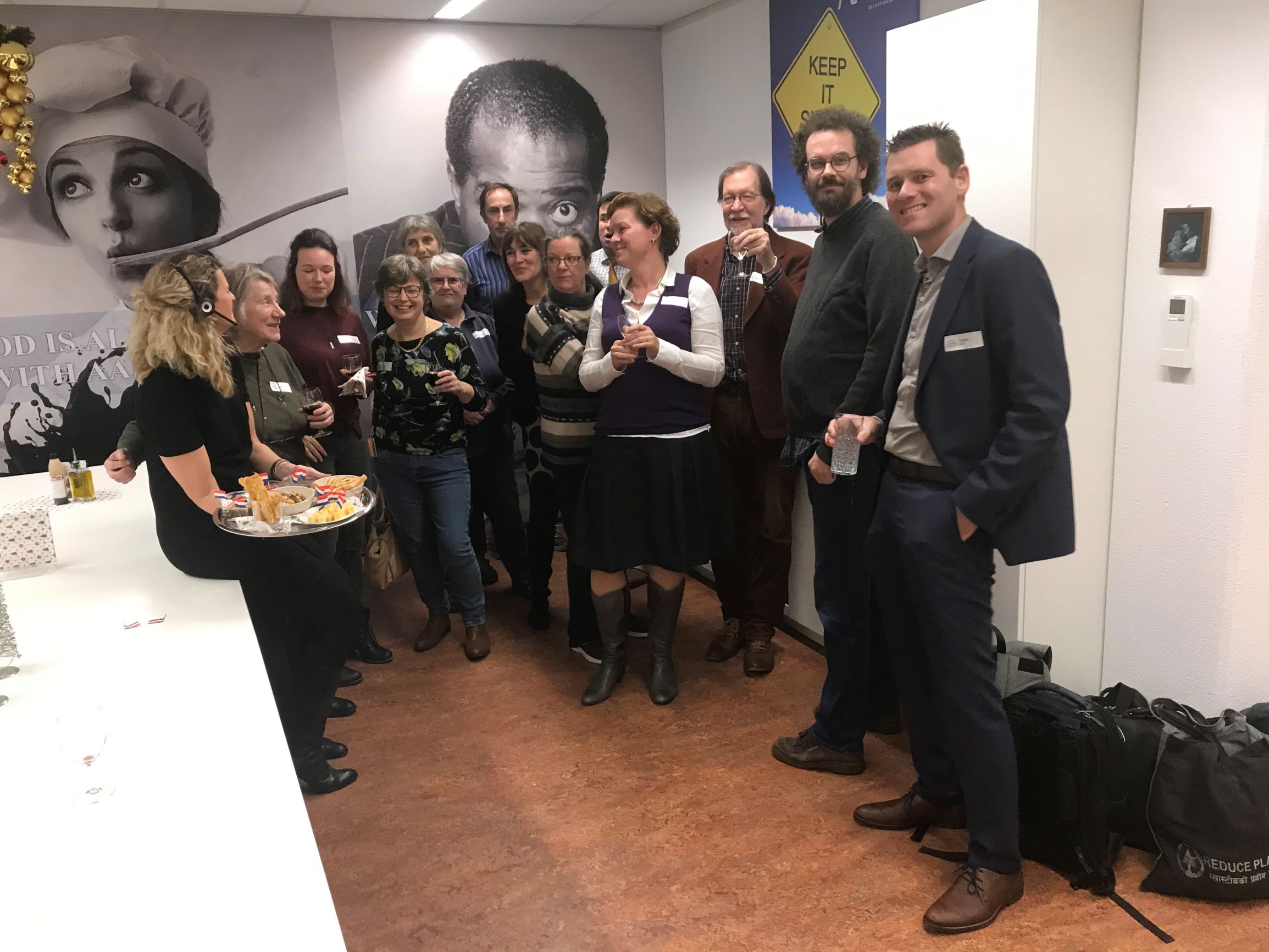
Photo by John Hynd
Whether it’s a blue envelope through the door or an email announcing Bericht van de Belastingdienst in uw Berichtenbox op MijnOverheid, either one is likely to fill you with dread at worst and irritation at best. So it’s no wonder so many SENSE members travelled to Delft on 10 December for the seminar Understanding Dutch tax for freelancers hosted by AAme Tax Consultants.
Tax advisor Quintin Eadie kicked off the proceedings with a comprehensive overview of the Dutch tax system. Among several subjects, he covered income tax procedures for filing returns, the benefits of having a fiscal partner such as a spouse or registered partner, and the different types of taxable income. He then went on to present proposed future changes to the Dutch tax system. These include a two-tier tax bracket system from 2021 onwards, the abolition of study costs as a deductible expense and the limitation of tax deductions to the lowest bracket. Of these changes, limiting tax deductions may have the biggest impact on freelancers. Although we will pay more tax in the long run, this may be offset by higher tax credits. This is by no means certain, however.
After a short coffee break, certified public ccountant Pauline Deelen-Aarts gave a presentation on BTW (Dutch VAT). She talked about the different categories of BTW – exempt, 0%, 9%, 21% – and where they apply. She also covered changes to the Kleine Ondernemersregeling and how to reclaim BTW paid on a bad debtor. Most importantly, Pauline highlighted the new BTW numbers coming into effect in 2020. Your new BTW number must be stated on your invoices and website (if applicable), but your old BTW number must be used in your BTW returns and any correspondence with the Dutch Tax Office. Nothing is simple when it comes to Dutch taxes!
During the BTW presentation, Jenny Zonneveld raised a question on behalf of SENSE members who have been approached by Scribbr, an online editing service for students. Besides paying low rates, Scribbr does not charge BTW, since it describes its services as ‘remedial teaching’ and therefore BTW-exempt. As this assertion is new to many SENSE members, we asked Pauline’s opinion. AAme will get back to us in due course.
Ronald van Leeuwen, certified public accountant, finished off the seminar with a presentation on fiscal benefits and various tips and tricks. He emphasized the importance of good administration and careful record keeping, including a daily record of hours spent on work and business activities. He also covered use of a company or private car and the SME profit relief, both of which are relevant to freelancers.
Like other attendees, much of the information presented was familiar to me, but it was good to be reminded on some points and have my mind put at rest on others. And as always, it was great to get together with other SENSE members and hear their tax experiences.
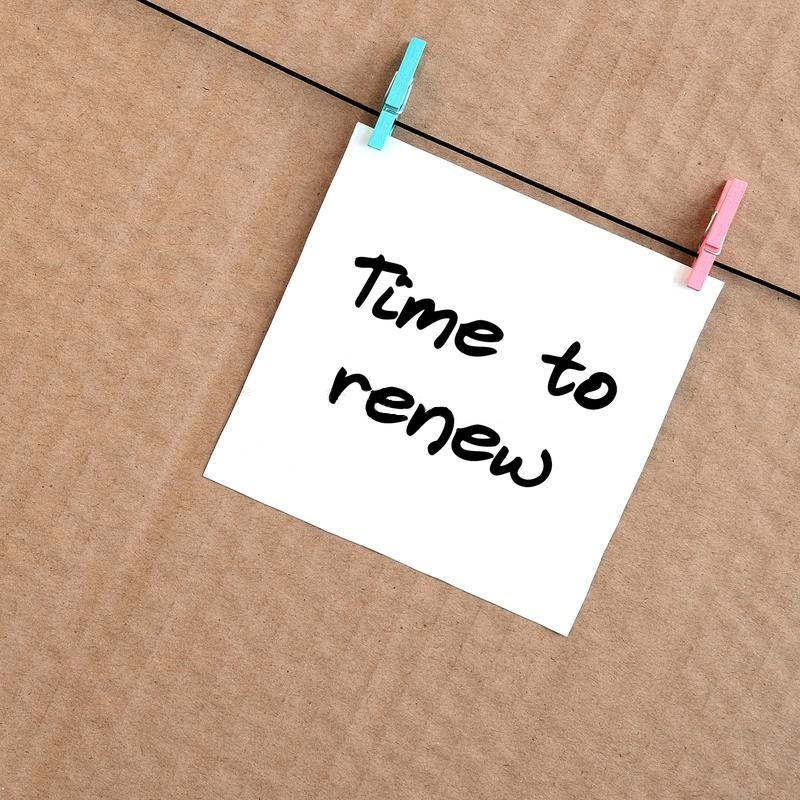
Yet another year has flown by and I am now in the midst of inviting members of SENSE to renew their membership for 2020. The first invitation went out on 2 December and, I am happy to say, more than 100 of you have paid up so far! Inevitably, there are always members who wish to cancel their membership – perhaps due to retirement or simply not having the time to participate in SENSE activities – but fortunately we have also been able to welcome some new members in recent months.
For anyone who may be thinking about joining SENSE, now is the time to do it! Our memberships run from January through to December, so if you join now you’ll be able to take full advantage of all the benefits SENSE membership has to offer. For example, we organize a number of workshops throughout the year, giving you the opportunity to hone your professional skills. There are also plenty of social events where you can practise your networking skills. The highlight of 2020 will be our Jubilee Conference to be held in Maastricht on 6-7 June. The theme of the conference is (Re)Vision: Honing our Skills to Meet Market Challenges. Registration will open shortly.
We also offer a members-only Handbook with a wealth of best-practice information for new and more seasoned language professionals, and Special Interest Groups where you can meet members in your geographical area or your specialist field. If you are interested, please see our Join page!
Current members, please remember to renew your membership by 31 January 2020! I will be sending a few reminders throughout January.
It only remains for me to wish everyone happy holidays, and I look forward to welcoming both old and new members to SENSE in 2020.
Best wishes,
Claire Koers
SENSE Membership Secretary
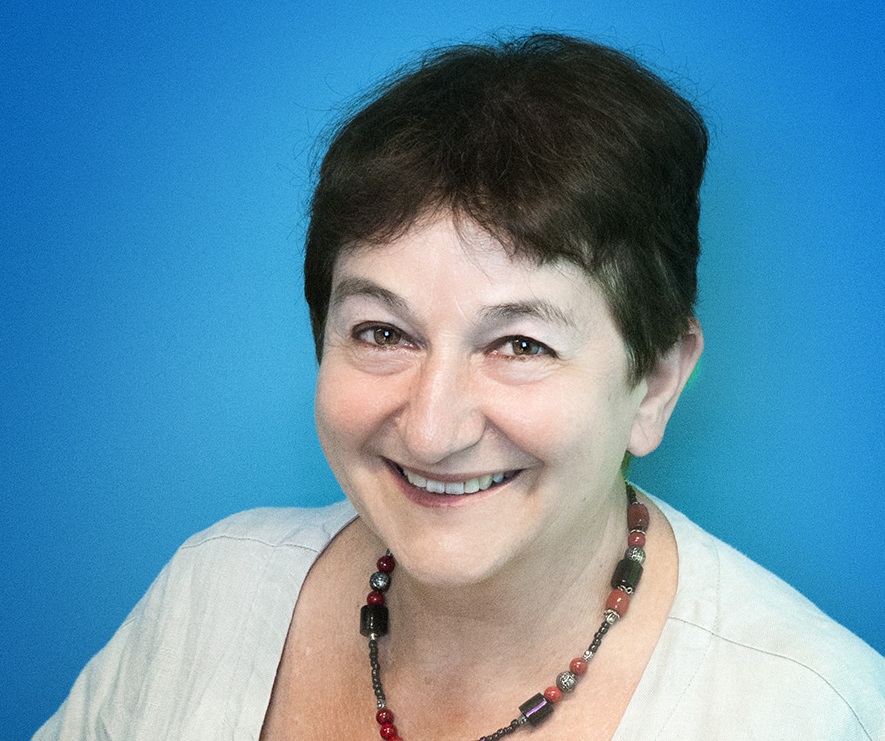
Ros Schwartz is an English literary translator who translates Francophone writers. In 2009, the French government awarded her the Chevalier d’Honneur dans l’Ordre des Arts et des Lettres for her services to French literature, and in 2017 she was awarded ITI’s John Sykes Memorial Prize for Excellence. She's coming to the Netherlands to give a workshop on 11 January 2020 and by way of a warm-up, we asked her six questions.
SENSE members usually work with clients (translating, editing and writing for their readers and clients) who are not native-English speakers. That often means avoiding idioms (both American and British) and keeping the writing simple and straightforward. How can they do that and still make it interesting, powerful and vivid?
That’s what we’re going to be addressing in my workshop! Simple doesn’t necessarily mean dumbing down. It means writing clearly and avoiding overly abstract language and convoluted sentence structures. The main thing when working with non-native English speakers is to build credibility and trust. Once clients are confident that you know what you’re doing, they’ll allow you the freedom to adapt your translations to the target culture.
Let me give you an example: I had a French client who regularly sent me press releases for the trade fair industry. French press releases are written in a completely different way from English ones: they start with a lot of general waffle, with the key information right at the end! I knew that if I simply translated the French, the result would not be fit for purpose and would end up in the bin before the reader even got to the main point. So how to convince the client? I translated one press release as it was, and then I wrote an English press release. It was half the length, punchier and had the essential information at the beginning. I presented both versions to the client, who immediately saw that my adapted version was much better suited to the English readership. After that, they would ask me to write a press release based on the French. We agreed an hourly rate that reflected my added value input. Outcome: a translation that was fit for purpose, and increased satisfaction all round. It is worth investing the time and effort in client education. These conversations should happen face-to-face when possible and you need to articulate your understanding of the differences between the source and target cultures in an authoritative way.
What other pitfalls do you think SENSE members should be especially aware of when writing for non-native readers?
Always ask to check the proofs and make it clear you consider that as part of the job. Non-native speaker clients will sometimes ‘correct’ the English without consulting you and typesetting programs sometimes introduce wrong punctuation (e.g. inverted commas, hyphenation). It’s important to acquaint yourself with the terminology or jargon the reader is familiar with, so ask the client for reference material (i.e. glossaries, previous translations) and read industry publications.
How can translators be better writers and still stay true to the original text? After all, they may have little leeway to rewrite the material they are given, or even to stray too far from the source. What advice can you give them?
It depends what you mean by ‘stay true to the original text’. You can remain true to the spirit but stray from the letter. Translation is first and foremost about communication, and it’s our job to communicate in the most effective way possible. Some source texts are poorly written, but that’s not an excuse for producing a poor translation. We shouldn’t lose sight of the overall purpose, which is to convey information or ideas. Again, we need to build client trust and convince them that we know how best to convey their message. This applies especially to fields such as tourism and art. Ultimately, we must have the confidence to see ourselves as competent writers, not humble servants of the source text.
Many clients do not share their ‘reader persona’ – if they even have one – with their translators or writers. When one is working on business texts, what should one do to convince the client to see things from the end-user’s perspective?
One thing you can do is refer to industry literature written in English. I’m thinking of the research into annual reports carried out by David Jemielity of Banque Cantonale Vaudoise. European companies often refer to themselves in the third person, whereas English companies use the first-person ‘we’. David’s superiors were very resistant to the idea of saying ‘we’, so he analysed annual reports written in English, which chiefly used the first person to talk about the company, versus translated annual reports, which slavishly used the third-person of the source text. Armed with these findings, he convinced BCV to switch to ‘we’.
What advice can you give to SENSE members who want to position themselves at the quality end of the translation market?
Work with direct clients so you can have the sort of conversations I’ve mentioned. And talk to them about the translation process to encourage them to build in the time you need to do a top-quality job. Most clients have no idea how long translation takes, so we need to be more transparent. As part of a client education talk I gave to a group of trade fair organizers, I held up a text of around 400 words and asked them how long they thought it would take to translate something of that length. They had no idea, hence the deluge of ‘urgent’ translations with impossible deadlines. So now, when I am asked to provide my rate, I include a planning guide, suggesting the time needed to translate texts ranging from 500 to 10,000 words.
If you’re charging premium rates, it’s also important to spell out what ‘quality’ means and what clients are getting for their bucks. It is always beneficial to have two pairs of eyes on a translation, especially when it’s intended for publication, so break down the quote into the different stages: research, compiling a glossary, creating a style sheet, translation, checking, copy-editing by an external professional, responding to client/author feedback and proofreading. And give an estimate of the amount of time involved. Often there’s a disconnect between the language we speak (price per 1,000 words/per page etc.) and that of the client. They’re interested in the overall price, and whether it comes within their budget. But if you want to stand out from cut-price competitors, you need to demonstrate what it is you’re offering that justifies your higher rate. Once the task is broken down into the different stages and days’ work rather than a price per word (which demeans what we do – we’re not just substituting words), the price makes more sense to the client.
Which three things do you hope SENSE members will take away from your workshop?
- Confidence in themselves as writers
- Concrete writing tips
- Contacts for future collaboration
Further reading:
- https://le-mot-juste-en-anglais.typepad.com/le_mot_juste_en_anglais/2012/09/ros-schwartz-traductrice-du-mois-de-septembre.html
- https://www.ata-chronicle.org/featured/how-long-will-it-take-you-to-type-this-in-english/#sthash.LCkkg3ew.LRknEDOT.dpbs
- https://bookblast.com/blog/interview-ros-schwartz-translator-week/
- https://www.englishpen.org/translation/translation-tips/
- https://www.youtube.com/watch?v=H9OxptvPFxc
- https://www.wordsandpics.org/2019/03/translation-ros-schwartz.html
- https://intralingo.com/spotlight-on-literary-translator-ros-schwarz/
- http://authors-translators.blogspot.com/2015/03/ros-schwartz-and-her-authors.html
- https://www.cleavermagazine.com/rachel-r-taube-interviews-ros-schwartz-translator-of-translation-as-tranhumance/

John Linnegar answers a question that often arises in the mind of the new entrant to the world of editing: Which reference works should I have at my disposal if I’m to edit professionally?
To be truly professional – and well organized and consistent – you should first consult the client’s house style for their preferences; then ascertain which dictionary (and which English, UK or US) they are wedded to. Then develop a sensitivity to particular disciplines’ preferences for spellings, capitalization/lowercase, hyphenation or not, use of italics, and so on. Once you’ve taken cognizance of these non-negotiables, it’s up to you to impose correctness and consistency on the documents your intervention will improve. Any edition of the publications listed below will be invaluable aids, but if you can obtain – and afford – the latest, they tend to reflect current trends and wisdom, and now also the most up-to-date technologies. The ‘starter kit’ is a fairly basic, but nevertheless an essential one. Begin with a mid-range dictionary for the language in which you typically edit. In English, you could choose between:
- Collins English Dictionary
- Concise Oxford Dictionary
- Cambridge English Dictionary
- Any of the Advanced Learner’s or Cobuild dictionaries
Word lists
Some word lists are available online, some free of charge (eg the Oxford Dictionary); others are available on CD for easy electronic access (eg Concise Oxford English Dictionary on CD-ROM; Collins English Dictionary on CD-ROM). Then, in addition, you’ll want to have access to word lists that help writers and editors specifically (they’re filled with the kind of quirky words that only we wordsmiths fuss over):
- Bryson’s Dictionary of Troublesome Words: A Writer’s Guide to Getting it Right (Broadway Books 2004)
- Martin H Manser Collins Dictionary for Writers and Editors (Collins 2006)
- New Oxford Dictionary for Writers and Editors (2014 or earlier)
Subject-specific references
For the internationally recognized conventions that apply in a variety of disciplines, you’ll be well advised to consult references such as:
- New Hart’s Rules: The Handbook of Style for Writers and Editors (2014 or earlier)
- The New Oxford Dictionary for Science Writers and Editors is but one of a range of many mini-dictionaries dedicated to specific subject areas
- Penguin has also published a range of specialist dictionaries (eg Electronics, Geography, History, Physics, Psychology) that are really worth investing in
- The latest edition of Oxford’s Concise Colour Medical Dictionary (5 ed 2010, with links) is a gem of a reference for wordsmiths working in this field
Style guides
To ensure consistency of spelling, punctuation, hyphenation, the use of numbers, and so on, there are a number of style guides to consider:
- Australian Style Manual for Authors, Editors and Printers (6 revised ed, Wiley, 2011)
- The Chicago Manual of Style
- Joseph Gibaldi MLA Handbook for Writers of Research Papers (Modern Language Association 2003) (US)
- Cheryl Iverson AMA Manual of Style: A Guide for Authors and Editors (OUP 2007) (US)
- The Oxford Manual of Style
- William Strunk and EB White The Elements of Style
Words, words, words
Sometimes, a thesaurus comes to the rescue when we’re at a loss for words. The classic is Roget’s Thesaurus (published under various imprints), but there are also reverse dictionaries (Reader’s Digest, Oxford, for example) that are enormously helpful. A dictionary of quotations can often also be helpful, specifically to check that quotations the authors include in their manuscripts are in fact accurately reproduced and correctly attributed: Penguin and Oxford have both published general and modern collections of quotations.
Grammar gurus
If your grammar’s rusty or the 'rules' are simply a bugbear to you, then find yourself a useful book on grammar/punctuation that covers the basics, possibly more. Some examples:
- Joy Burrough-Boenisch Righting English That’s Gone Dutch (Kemper Conseil 2013)
- James Cochrane Between You and I: A Little Book of Bad English (Icon 2005)
- GV Carey Mind the Stop (Penguin 1980)
- Marion Field Improve your Punctuation and Grammar (howtobooks 2003)
- Fowler’s Modern English Usage (OUP, various editions)
- Garner's Modern English Usage (OUP 2016)
- Good Punctuation: The One-stop Punctuation Problem Solver (Collins 2004)
- Sir Ernest Gowers The Complete Plain Words (various editions)
- John Kahn (ed) The Right Word at the Right Time (Reader’s Digest 1985)
- Noah Lukeman The Art of Punctuation (OUP 2007)
- Elizabeth Manning Murphy Effective Writing: Plain English at Work (Lacuna 2014)
- Eric Partridge You Have a Point There: A Guide to Punctuation and its Allies (Hamish Hamilton)
- Eric Partridge Usage and Abusage (Hamish Hamilton)
- John Seely Oxford A to Z of Grammar and Punctuation (OUP 2013)
- RL Trask Penguin Guide to Punctuation (Penguin Reference 1997)
- HA Treble & GH Vallins An ABC of English Usage (Oxford/Clarendon Press 1936)
- Ben Yagoda When You Catch an Adjective, Kill It: The Parts of Speech, for Better and/or Worse (Broadway Books 2007)
Citations
For help with styling citations and reference lists or bibliographies, the following titles are useful guides:
- Marlene Burger Bibliographical Style and Reference Techniques (Unisa Press 2010)
- Joseph Gibaldi MLA Handbook for Writers of Research Papers (Modern Language Association 6 ed, 2003)
- Charles Lipson Cite Right (University of Chicago Press 2009)
Sage guidance on editing
Finally, for sage guidance on all matters editorial in general:
- Judith Butcher, Caroline Blake & Maureen Leach Butcher’s Copy Editing (Cambridge University Press 2007 – or any earlier edition of this classic)
- WAM Carstens & Kris Van de Poel Teksredaksie (SunMedia 2010)
- Gill Davies & Richard Balkwill The Professionals’ Guide to Publishing: A Practical Introduction to Working in the Publishing Industry (Kogan Page 2011)
- Amy Einsohn The Copy-editor’s Handbook (University of California Press 2000, 2005)
- Elizabeth Flann, Beryl Hill & Lan Wang The Australian Editing Handbook (John Wiley 3 ed, 2014 — or any earlier edition)
- Janet Mackenzie The Editor’s Companion (Cambridge University Press 2004)
- Janet Mackenzie (ed) At the Typeface: Selections from the Newsletter of the Victorian Society of Editors (Victorian Society of Editors 2005)
- Elizabeth Manning Murphy Working Words (Canberra Society of Editors 2011)
- Scott Norton Developmental Editing: A Handbook for Freelancers, Authors and Publishers (University of Chicago Press 2011)
- Carol Fisher Saller The Subversive Copy Editor: Advice from Chicago
- Kris Van de Poel, WAM Carstens & John Linnegar Text Editing: A Handbook for Students and Practitioners (UPA, 2012)
Of course, you do not have to stock your personal library with all of the tools of the trade included here – publishers’ and public libraries will usually have them available to consult as and when the need arises. You’ll be the best judge of those genres and titles you will most need to have as stalwart, regular aids – as investments in your professionalism those will be worth their weight in gold.
This article was originally published in eSense 41 (2016).
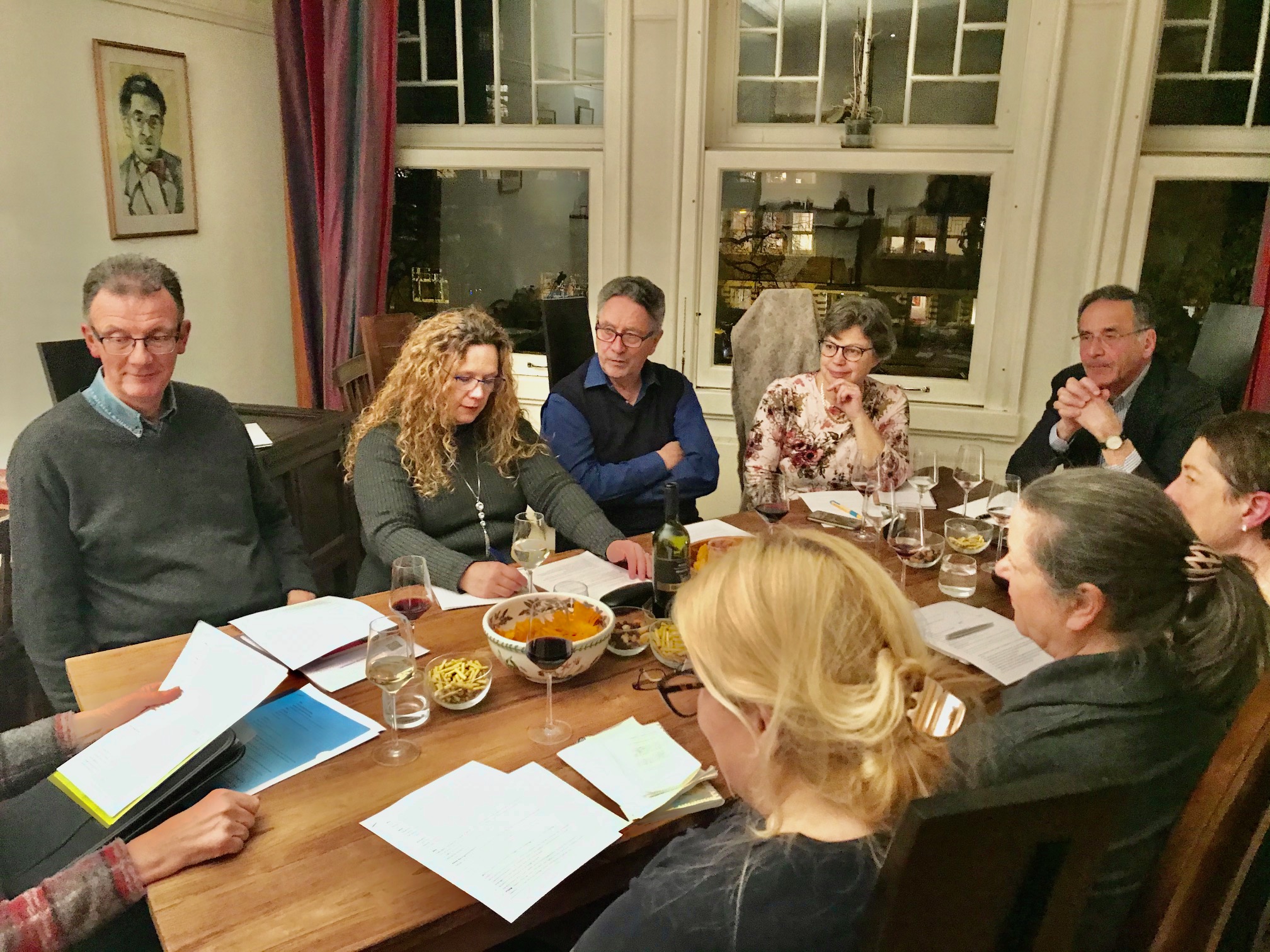 (Photo by John Hynd)
(Photo by John Hynd)
Nine of us gathered at John Alexander’s delightful Art Deco home in Amsterdam to discuss two barely comprehensible texts provided by Alison Gibbs and to learn from her extensive experience as an editor and translator.
While we munched on the nibbles and savoured the wines, Alison enthusiastically described her own types of work and clients, dispensed useful pieces of advice and outlined common pitfalls. One of her key suggestions (originally contributed by a wary/weary handyman) was to ‘know when to stop’. Other warnings included to avoid wasting time on grammatical blunders encountered during one’s everyday life: “There are more productive ways of channelling my nit-pickery than correcting greengrocers’ apostrophes.”
A dizzying array of practical and professional tips followed, including on how to assess jobs, clarify clients’ expectations, charge for one’s time, review editorial changes, use online tools and resources, and check for common errors.
While still attempting to digest this rich diet of advice, we gingerly bit into the two texts – and quickly stubbed our teeth. It was generally agreed that the almost impenetrable one about the Azores was worth steering clear of, while the taxation one was to be attempted only by the most intrepid souls (or those with serious insomnia). Alison’s own versions, however, read like an English-language dream – attesting to her dedication, finely-honed detective skills and feminine intuition.
We ended the evening much the wiser, not to mention a little the merrier. Hic!
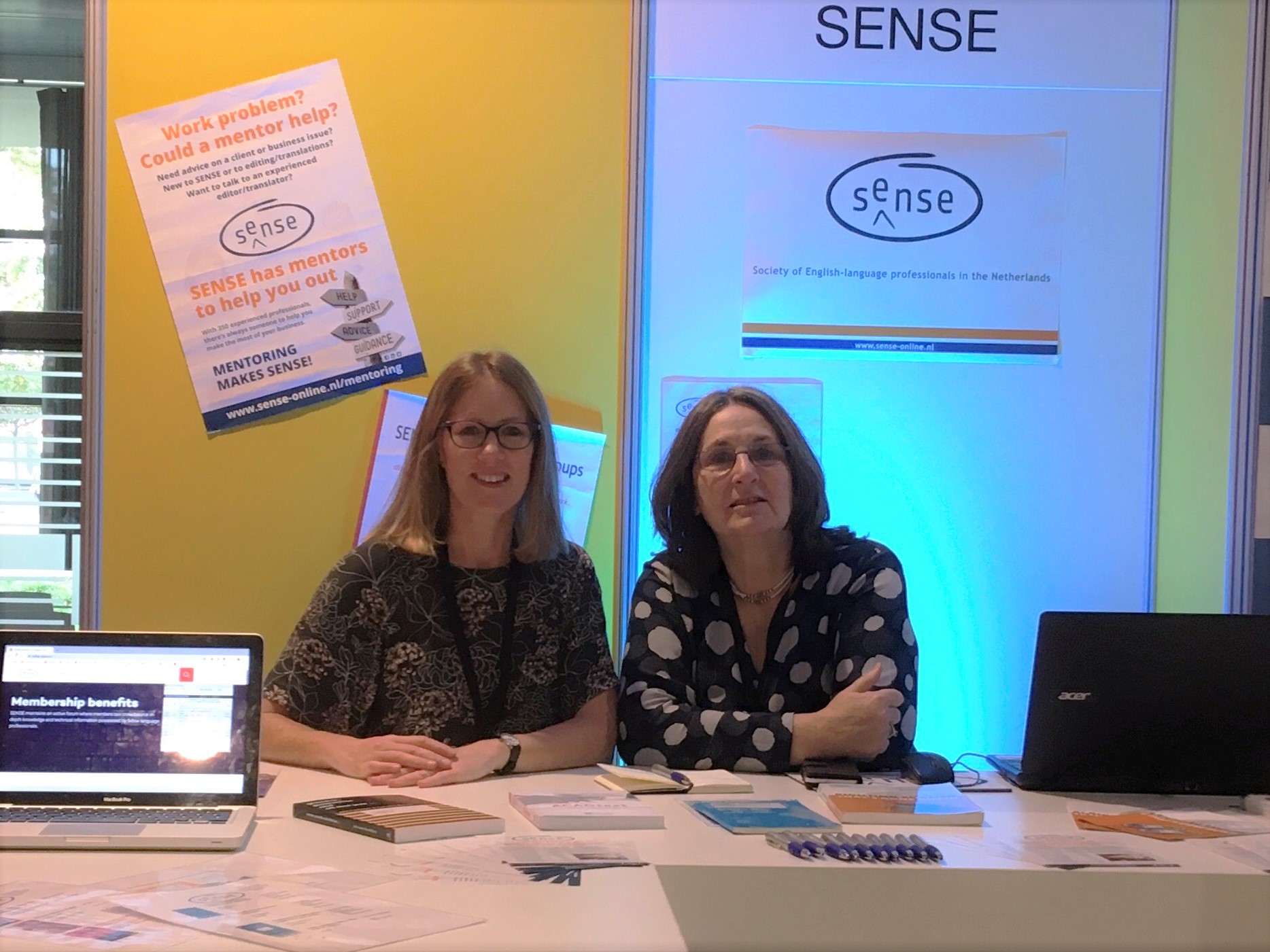
(Sally Hill and Daphne Visser-Lees at DRONGO language festival 2019)
Earlier this year, SENSE decided to book a stand at DRONGO language festival with the twin aims of raising our profile in the wider language community and potentially gaining some new members from the university and allied language communities.
For those of you unfamiliar with the DRONGO language festival, it started out in 2012 as a small afternoon event organized by De Taalstudio and held at Amsterdam Central Library. Since then, it has grown into a two-day event: as well as the exhibition itself, there is a two-day programme of language-related talks and interactive events. This year, DRONGO was held at the Elinor Ostromgebouw at Radboud University in Nijmegen. Our fellow exhibitors included publishers, academic institutions, the Royal Library of the Netherlands, the National Platform for Languages, the Ministry of Education, Culture and Science, developers of interactive educational equipment, the EU and representatives of many language communities, including Esperanto!
From about 08:00, students and teachers started walking past the stands on their way to class, and a number of them showed interest in what SENSE had to offer. Not long afterwards, fellow Friday exhibitor Sally Hill arrived bearing coffee and good cheer. Things really started to liven up from about 10:00; in fact, the SENSE stand had almost continuous footfall for the rest of the day.
We had a great diversity of visitors, but there was particular interest from some course co-ordinators from Radboud itself, from Utrecht University and from ITV: all were looking for English teachers and some for internships for their students. Emma Hartkamp from the European Commission stand came over to talk to us about the problems of recruiting freelance translators for the EU in the Netherlands.
As a number of our members are published authors, we had decided to take some examples of their books along, as well as SENSE publicity materials. As ever, Righting English that’s Gone Dutch proved popular – Joy Burrough’s publisher, who was also at DRONGO, was offering it to SENSE members at an extra special price. Both Lee Ann Weeks and Mike Hannay dropped by and were very pleased to see we were advertising their wares! Unfortunately, it was far too noisy to show the compilation video of Ed Hull’s recent YouTube appearances.
Some of the students who visited the stand stayed to talk to us for quite some time. They were variously full of enthusiasm about the courses they were following, and down in the dumps about their own level of English. At one stage, we felt somewhat like a couple of agony aunts, but we plugged our student membership rate and our mentoring programme, and emphasized the breadth of English-language knowledge available amongst SENSE members!
Mike Gould and Claire Koers, who manned the stand on Saturday, had a much quieter day. However, this did give Mike the opportunity to brush up his knowledge of the Berber language, while Claire attended a crash course in Frisian! During a tour of the stands, Claire also came across Olaf & Giraf, the leading characters in a series of books and other learning materials designed to introduce English to Dutch primary school children in a fun way. Sarah Thompson, the creator of this innovative concept, often goes into schools with her Dutch partner and reads her stories to the children. The main text is in Dutch, but English words or short sentences appear throughout the story, followed by a short explanation of their meanings in Dutch. This is also an ideal tool for parents raising their children in both English and Dutch.
From a personal point of view, my first visit to DRONGO was an extremely enjoyable one. It has that conference feeling in that we were most definitely among kindred spirits. It also threw up one or two unexpected incidents: I happened to mention my continuing difficulty with the correct use of the definite article to a passing Dutch teacher and was given an impromptu and extremely illuminating 15-minute lecture on the subject! It is still early days to say if DRONGO will have proved to be a good vehicle for recruiting new SENSE members, but I am sure we have managed to raise SENSE’s profile a number of language and university communities.
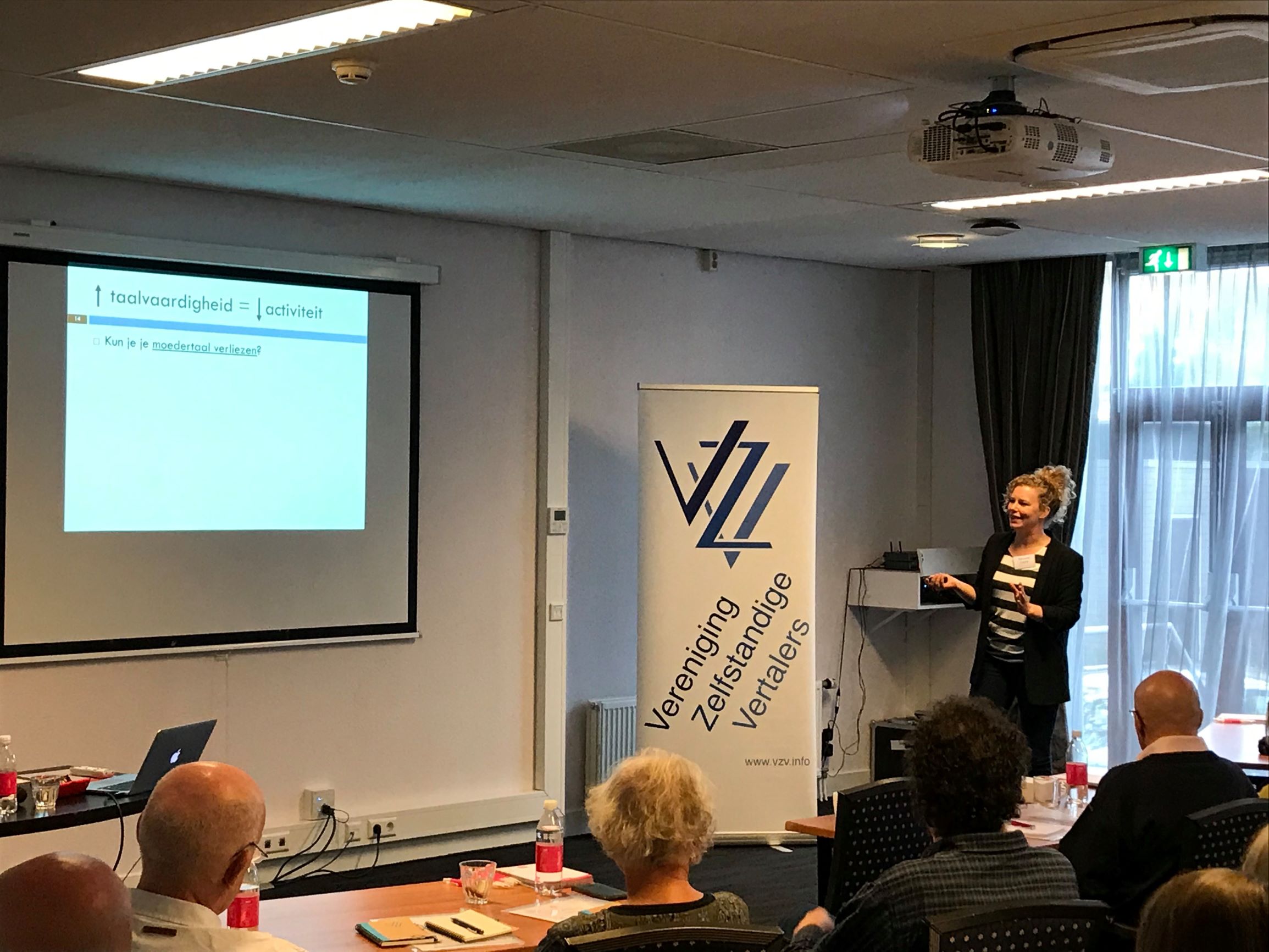
(Photo by Karin Krikkink)
This year’s theme of the symposium organised by the VZV (Vereniging Zelfstandige Vertalers) was: Mother tongue: a work in progress. The fact that this title did not end with a question mark already anticipated the final conclusion of the afternoon: Yes, it is a work in progress! You have to keep working on it, using it, immersing yourself in it, to make sure that you can continue to deliver quality translations. But back to the programme. We had an interesting start with Hanneke Loerts, lecturer at the Department of Minorities & Multilingualism at the Rijksuniversiteit Groningen, who talked about how our brain learns, processes and loses language. She took us along on the journey of how we learn language, from baby to young child to adult, showing how we grow and solidify connections between the neurons to learn and remember words. It was fun to see what happens in the brain with people who speak multiple languages: the brain has to work a lot harder to identify words in other languages than the one you learned as a child, and you can see that on the scans. The conclusion of research carried out is also that people who keep their brain active keep it healthier for longer. That is good news for multilinguals like us, but also for people who continue to learn and work with their brain in other areas, such as making Bob Ross paintings!
From the brain we moved on to the actual translation product on paper, and how language and our language skills have changed with time. Should we be worried about this development? And what can we do to safeguard the quality of translations in the future? Fedde van Santen, lecturer at ITV Hogeschool, talked about his mission to find the ultimate method to ensure that his students master their languages at the highest level of competence. After all, he argues, to be able to produce texts at a level that people with low literacy skills can read (B1), you really need to master a language at C2 level: the legibility of a text does not lie in short words, but in a logical construction of that text. And that is one of the major problems that Van Santen sees in the work of his students these days. One of the causes, according to him is that they hardly read anymore (well, they read, but mostly short texts on devices, not novels on paper), and as a result, they find it harder to make translations that flow, that have a logical structure, that use the right register, etc.
The panel discussion, also including Tia Nutters, language coordinator at the Rijksuniversiteit Groningen Language Centre, and Tony Parr, co-founder of Teamwork and well-known among seasoned language professionals, focused on these issues and also on the question posed at the start: how can we ensure we keep our mother tongue at a high level? And what actually is our mother tongue? We had a lively discussion, with native speakers of various languages confirming that to keep up with developments in your mother tongue, just translating and reading is not enough: you have to actually speak the language on a daily basis and immerse yourself in the culture, to make sure you don’t end up using the version of the language that was prevalent when you left the country twenty or more years ago. Indeed: a work in progress!
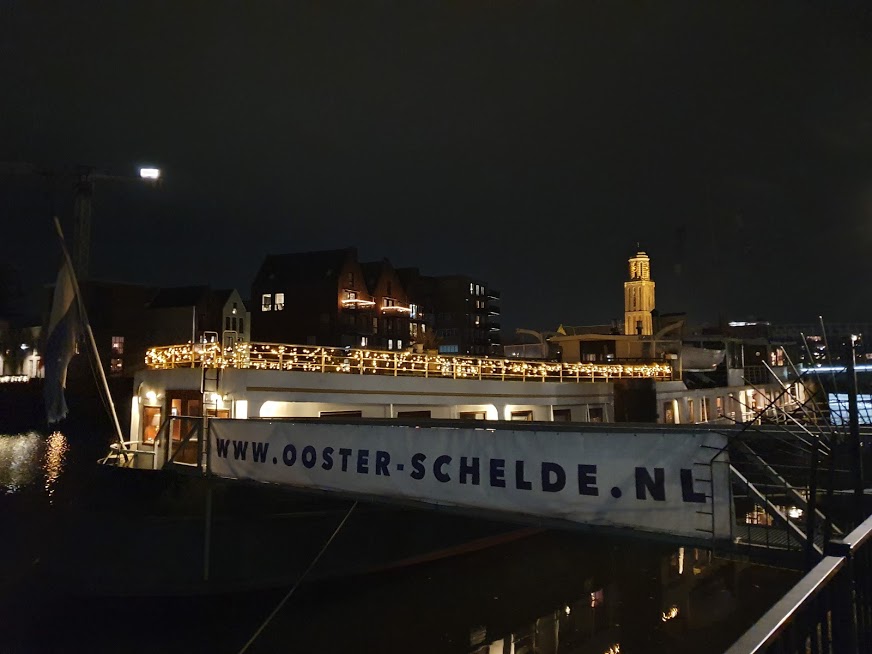
On Saturday 16 November, about 35 SENSE members and their partners gathered on board the historical Ooster-Schelde in Zwolle for good food, good fun and good conversation. Although the ship’s low ceiling proved somewhat challenging for anyone over 1.75m – yours truly and partner included – the location was very gezellig.
Dave Thomas welcomed us all and introduced the evening’s entertainment: acoustic duo The Tickets treated us to a range of ‘classics from the golden age of pop.’ While it proved difficult to hold a conversation without repeating yourself, the music definitely added to the hearty atmosphere.
Daphne Visser-Lees had come up with some excellent icebreakers to get us all off to a good start. We kicked off with ‘pin the apostrophe on the word’: after being blindfolded, Ellen Singer, Curtis Barrett and Daphne herself valiantly tried to provide increasingly complicated words with the correct punctuation. Naturally, those in the audience did their best to confuse them. Qu’est-ce que c’est?
The informal arrangement of chairs and tables were ideal for mingling, and the starters (warm beetroot and goat cheese salad, followed by a tumbler of pumpkin and tomato soup) were plated in such a way they could be enjoyed while standing. A very good start!
The main course consisted of a buffet and offered a variety of dishes. On a personal note, I was somewhat disappointed that two out of the three previously advertised vegetarian options were, in fact, not on the menu after all, but the remaining option and side dishes proved very tasty.
Once dinner was cleared away, it was time for another classic party game: pass the parcel! And what a sight it was: thirty-odd adults trying to gauge what was in each gift before reluctantly passing it on to the next person. Sadly, I didn’t go home with the coveted set of full-sized Toblerone bars... Enid Tomkinson regaled us with two poems recited by heart, and then it was back over to The Tickets for another set.
Any lingering doubts about the food were swiftly diminished once dessert was served. Apple pie and tropical hangop and chocolate mousse, oh my! After that, some more mingling and informal conversation over drinks. All in all, a highly enjoyable evening: definitely ‘voor herhaling vatbaar!’

At the invitation of PZO, I attended their recent event for freelancers at the Miele Experience Centre in Vianen on 10 October. The event was kicked off by two trendwatchers known as the Fountainheads. This dynamic duo took us on a journey through the latest technological developments and social trends; their high-speed delivery tested the limits of my Dutch, but the main message was that new learning methods, knowledge-sharing and a considerable adaptive capacity are essential tools in our fast-changing world. At the end, they implored us not to waste any valuable time, because every minute counts. In other words, if you snooze, you lose!
Cybercrime
We were then treated to a presentation by cyber-crime expert Rickey Gevers. Rickey once served an 18-day prison sentence for hacking the University of Michigan’s server. Nowadays, he puts his expertise to good use as Chief Intelligence Officer at the cyber-security company RedSocks and as an ‘ethical hacker’ at the Hacker Company.
He started off by telling us that awareness is key. In spite of all the publicity surrounding suspicious emails, people are still clicking links, opening PDFs, using unknown USB sticks, connecting to public Wi-Fi networks and using the same password for their business accounts (email/VPN) and their LinkedIn accounts.
His advice on passwords:
• Use symbols
• Use numbers
• Use both upper-case and lower-case letters
• Use a different password for each website
• Don’t write down your passwords
• Don’t store your password in your email account
• Change your password every month
• Make your password as long as possible
Apparently, President Obama was notoriously difficult about his passwords. He insisted on using 123456. However, when his security advisers finally persuaded him to change his password, what did he do? You’ve guessed it – 654321! You can check the password of your own email account on Rickey’s website. Just fill in your email address and see if he has good or bad news for you! He wrapped up by stressing the importance of backing up your work and updating your system. Do those updates straightaway!
Breakout sessions
After a delicious ‘walking dinner’ – what else would you expect at the Miele Experience Centre, well-known for its cookery workshops? – I attended two breakout sessions. The first one involved the ins and outs of working in the cloud or, to be precise, with Microsoft Office 365. We learned that this software allows you to be productive anywhere, to work better together and to protect what matters. You can use it on all your devices. As I work with Microsoft Office 365, I was particularly pleased to learn about some of the functionalities I had not yet discovered. It was also reassuring to learn that protection against spam, malware and viruses is continually updated.
The second breakout session was presented by the AON insurance company and Freelance.nl. Armed with an iPad, we all took part in a pub quiz and answered questions relating to our digital security. This was fun and informative. The session was rounded off by a tip from AON about the importance of cyber-insurance. Not many people know that ‘cyber risks’ are not covered by the insurance policies we normally hold.
Following the breakout sessions, which also covered topics such as working with social media, the secrets of good communication and the latest developments in digital payment methods, there were opportunities for networking, accompanied by the inevitable hapjes en drankjes! During this networking session, I had an interesting conversation with a member of Bites & Business – a nationwide network for women in business. This organization arranges monthly networking evenings (including dinner) in more than 25 locations around the country. During these evenings, women have the opportunity to exchange knowledge, ideas and experiences with each other. They also organize workshops, training courses and weekends away here in the Netherlands or abroad.
It was obvious that PZO had put a great deal of effort into organising this event. The keynote speakers and the breakout sessions covered a wide range of topics that are of particular interest to freelancers and there was plenty of opportunity to network with the presenters and other attendees. Well done, PZO!
(Photo courtesy of Robert Zwart for PZO, 2019)